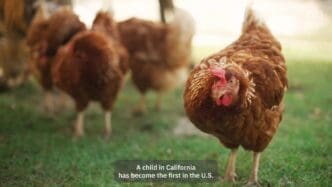A young child in California has become the first minor in the United States to be diagnosed with the H5N1 bird flu, sparking concerns about environmental factors potentially influencing the virus’s persistence and transmission.
The recent identification of H5N1 in a Californian child marks a significant event in the ongoing study of avian influenza. According to health officials, the child, whose identity remains confidential, is currently recovering. This case underscores the unpredictable nature of viral transmissions and the necessity for ongoing vigilance, especially as changes in weather patterns might exacerbate such issues.
Health experts are particularly concerned about the role of cold, wet weather in the spread of the virus. Such conditions may provide a more conducive environment for viruses to survive outside their hosts, thereby increasing the risk of transmission to humans. Bob Smith, an epidemiologist, noted, “The interaction between weather and viral spread is complex, but there’s a possibility that certain weather conditions might aid these viruses.”
This case has prompted a closer examination of regional health protocols and the effectiveness of existing preventive measures. Authorities are working to trace any contact the child might have had with infected birds and assess the risk to public health. The Centers for Disease Control and Prevention (CDC) continues to monitor the situation closely and advises vigilance in both healthcare settings and the community.
While avian influenza primarily affects birds, sporadic human infections can occur, primarily involving those with direct or indirect exposure to infected poultry. Therefore, public health messaging focuses on reducing contact with potentially infected birds and maintaining strong biosecurity measures on farms.
Meanwhile, local health departments are reinforcing their communication with the public about the importance of recognizing early symptoms and seeking medical advice. Dr. Jane Doe from the California Department of Health stated, “Early detection and intervention are crucial in managing and containing potential outbreaks.”
This incident in California highlights the ongoing global issue of avian influenza and the complexities in managing infectious diseases that can cross species barriers. The case serves as a poignant reminder of the importance of global surveillance and rapid response to emerging health threats.
As the child continues to recover, health officials remain alert to any further developments in avian influenza cases. This instance reflects the need for robust surveillance systems and public awareness to mitigate the risks associated with infectious diseases.
Source: Weather








